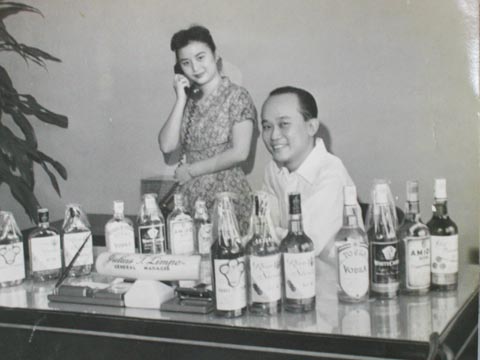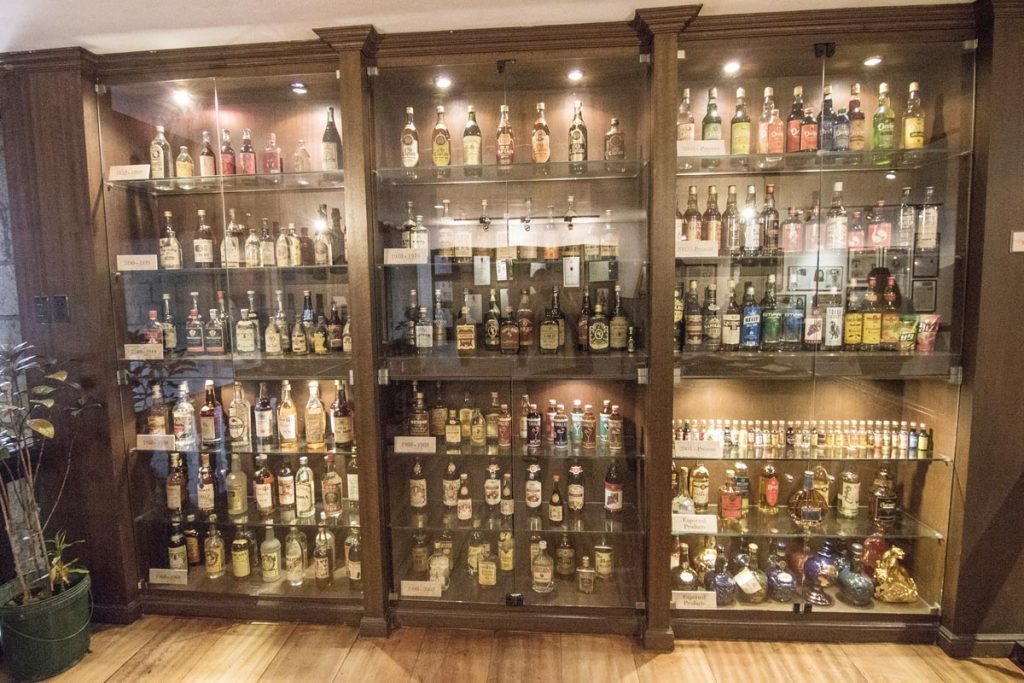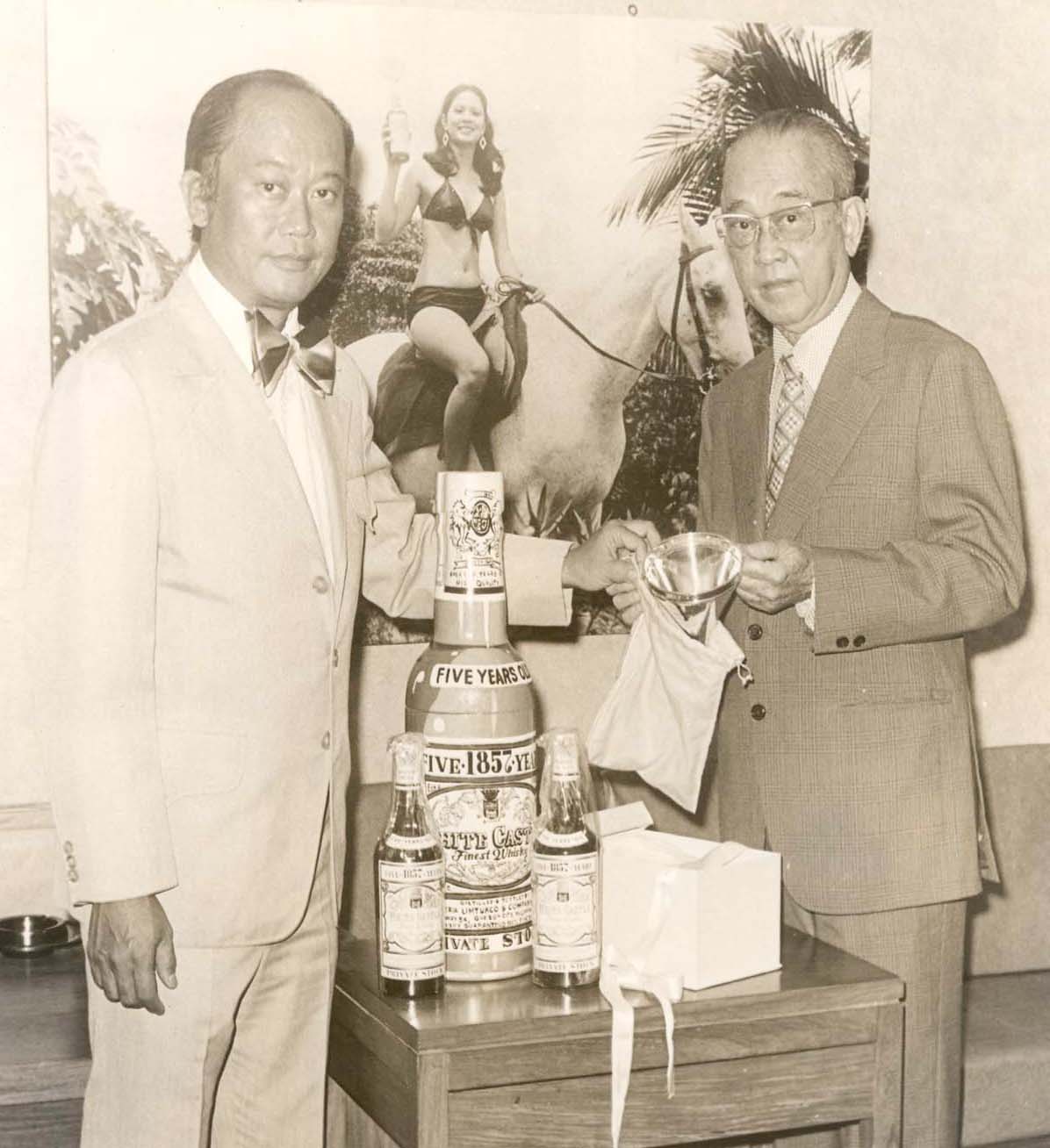First published in Tulay Monthly, Chinese-Filipino Digest 1, no. 7 (December 11, 1988): 5; 15.
In the Philippines, the Christmas season is marked by religious solemnity, great festivities and revelry. Part of the merry making is the abundance of food and drinks. For the ordinary citizens, among the favorite beverages are such Filipino-made alcoholic drinks such as Ginebra (gin), rhum or whiskey. For the rural areas, other popular drinks are native wines (tuba) made out from sugar canes or coconuts.
In the entire Far East, the pioneer distillery manufacturing Western-style liquors is the Destileria Limtuaco & Company, Inc. (穎源酒廠) This firm was established in the old business district of Binondo in 1852 by Don Bonifacio Limtuaco. Upon receiving citizenship, the Chinese immigrant became an acknowledged Filipino-Chinese business and civic leader of his time.

His son was educated in the 19th century Ateneo de Manila inside Intramuros — where the young Jose Rizal also received his schooling. Before Limtuaco came to Manila, wine making was already an old family tradition in Fujian, China. Their firm contributed to the economic advancement of Philippine life, as had other family enterprises founded by other immigrants.
One and a half centuries later, the heirs of Limtuaco still continue his business activities as Filipino-Chinese who had proven true to their citizenship as well as selfless in working for the Filipino-Chinese community welfare. An heir, the American-educated James Limpe was jailed in Fort Santiago for his defiant stance against the Japanese invaders in the Philippines along with many other Filipino-Chinese leaders.
Other fellow Filipinos jailed in Fort Santiago were Jovito Salonga, Capt. Ferdinand Marcos, Raul Manglapus and Gen. Vicente Lim.
The reason for Limpe’s imprisonment: he obeyed the last-minute instruction of Gen. Douglas MacArthur for liquor manufacturers to shut down operations and dump their products before the entry of Japanese troops in Manila. Other Filipino businessmen of Chinese descent likewise withheld cooperation with the invaders, while maintaining the vital economic life support system of the colony.
A son of the late James Limpe, Jerry Limpe is today an active official of the low-key Federation of Filipino-Chinese Chambers of Commerce and Industry, Inc. (FFCCCII), a group of Filipino businessmen of Chinese descent who are fully supportive of the national economic recovery effort. Another son, Julius, schooled in Chinese and also trained in an American business school, is the manager of the distillery firm.

A family member said: “For generations, the natural process of integration of the Chinese has been on-going, giving rise to the Filipino-Chinese community whom President Aquino has repeatedly lauded as patriotic Filipinos working for economic progress. Also, it is proven that quiet works of generosity and philanthropy will be rewarded with better business earnings.
Integration is not a new phenomenon at all, it has been there since centuries back, where we become citizens while retaining our cultural heritage.”
Another observer pointed out the case of the Bronfman clan, the world’s largest alcohol manufacturer due to their Seagram Co. One branch is New York-based, American-Jews whose leader is the young Edgar Bronfman Jr., president of the World Jewish Congress. Another branch of the clan are Canadian-Jews. The family had fled from the racist pogroms of Eastern Europe and settled in North America before World War ll and built up Seagram into what Fortune calls “the world’s largest distiller.”
A businessman said: “The Bronfmans are respected as American and Canadian citizens, just as the Limtuaco family is respected as the Filipino pioneer.”
Proof of the family’s quiet service to the Filipino nation is their consistent support to the Filipino-Chinese business sector’s “Operation: Barrio Schools.” Recognized by President Aquino as a noble Filipino endeavor, it aims to build and donate thousands of school houses for the country’s depressed areas.
An American educated young banker said of this project: “This project shows the Filipino-Chinese sector’s belief that one of the best ways to combat poverty and injustice is to promote democratized educational opportunities for all our countrymen. Unlike the old ways of financial dole-outs and donations, building schools is more positive, it is like a long-term investment to aid the children.”
The “Operation: Barrio Schools” is one of the most important civic projects of the FFCCCII.

Today, Destileria Limtuaco is a low-profile firm who remains steadfast in their business confidence in the country’s future. An official said: “For close to one and a half centuries, our firm had remained confident and continuously produces alcoholic drinks for the public, whether in war or peace, crises or prosperity.”
Among the top of the line products of the firm available this Yuletide season at popular prices are White Castle whiskey, Batch One whiskey, Old Captain rhum, LTD rhum, Ginebra Kelly, Napoleon Brandy, Maria Clara Sangria, Wine Cooler, various Cooler brands, medicinal wines and vodkas.
Another officer added a final comment: “As indubitable proof that the present-day Filipino-Chinese businessmen are helping work for economic self-sufficiency, the Destileria Limtuaco & Co., Inc. is a member of the Buy Philippine-Made Movement which champions Filipino business against imported foreign goods. This isn’t an anti-foreign campaign, but a pro-Filipino business campaign.”
